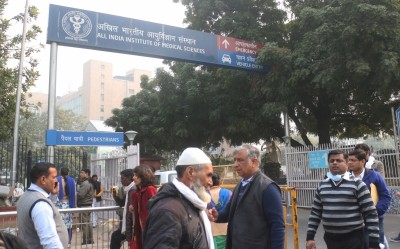New Delhi, Dec 8 : Various associations of resident and senior doctors from the government and private medical institutions across the country have shown solidarity with public demonstrations called by the Indian Medical Association (IMA) on Tuesday to oppose the Central government’s recent actions and policies in the field of health and medical education.
The associations participating in the protests include resident doctors association (RDA) of the Centre-run All India Institute of Medical Sciences (AIIMS) and Tamil Nadu Government Doctors Association (TNGDA).
Around two lakh doctors from medical colleges, government services, general practitioners, specialists, resident doctors and medical students have planned for a peaceful public demonstration against three contentious moves by the Centre, which include the latest amendment by the Central Council of Indian Medicine (CCIM) that allowed Ayurvedic postgraduate students to receive formal training to perform 66 types of medical procedures.
Another issue is the National Education Policy 2020, which proposes to phase out all institutions offering single streams and that all universities and colleges must aim to become multidisciplinary by 2040. Third is the formation of four committees by the NITI Aayog to formulate policies on integrative medical education, practice, public health and research.
Adarsh Pratap Singh, President, AIIMS’ RDA said that mixing of streams of medicine poses hazardous risk to the health of innocent, general population which may be irreversible and fatal.
“India has been at the forefront in the field of medicine and it is Indians who are amongst the best medical practitioners all over the world. We all owe it to the medical education in our country which proves to be distinct globally. Even in the times of pandemic, modern medicine has proven to reduce mortality and morbidity.
“Modern medicine has evolved over a period of time through groundbreaking research and all the possible developments. This journey of modern medicine is entirely different from that of Ayurveda, therefore, it is neither legitimate nor safe for our patients to be treated by the doctors with incomplete knowledge of the different streams,” Singh said.
“We are clearly against the mixing of streams of medicine since it poses hazardous risk to the health of innocent, general population which may be irreversible and fatal,” he added.
The Federation of Resident Doctors Association (FORDA) stated that the recent gazette notification by the CCIM that defines professional competency expected from the post-graduates of various streams of Ayurveda has created a grey zone that is likely to be exploited, encouraging unethical medical practices. “Its adverse effect will have to be borne by the people, especially the rural population who already have limited access to healthcare,” said Dr. Sunil Arora, general secretary, FORDA.
“We are in no state of defining any stream of medicine being superior to another. Each and every system of medicine was developed and has attained today’s status by adhering to its principles. Overnight conversion of one stream to another will not only undermine their originality, but would also lead to intermingling of various treatment methodologies in the name of integration which may affect standard of patient care and teaching,” he added.
Disclaimer: This story is auto-generated from IANS service.

